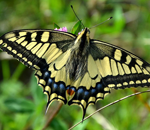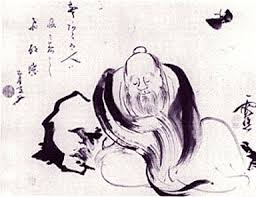Do Caterpillars Know They’ll Become Butterflies?
Now I do not know whether I was then a man dreaming I was a butterfly, or whether I am now a butterfly, dreaming I am a man. — Zhuangzi
Today I’m going to talk about two of my favorite things: psychology and butterflies.
Now, this first part may be a little boring, but it’s useful for understanding the more interesting, second half. And additionally, I get paid by the word for writing these posts–paid in smiles that is… Oh, gosh, somebody punch me in the face.
We’re going to begin today discussing classical conditioning, a topic you may be familiar with from Pavlov and his dog. The story goes, Pavlov would ring a bell (what we psychologists call the “conditioned stimulus,” i.e. the stimulus that had no prior meaning) then he would feed his dog (the “unconditioned stimulus,” i.e. the stimulus that has inherent value).
So Pavlov would ring a bell, feed his dog. Ring a bell, feed his dog. Over and over he did this until finally, when he rang the bell, the dog stood on its hind legs, slapped Pavlov in the face, and told him to answer the damn door.
I jest. When Pavlov rang the bell, the dog automatically started salivating. Thus, Pavlov was able to train the dog to “pair” the conditioned stimulus (the bell) with the unconditioned stimulus (the food) and elicit the “conditioned response” (the drooling). Now, how does this relate to butterflies?
As any person who’s ever experienced puberty, you’ve likely been told, “Hey. Remember that even the ugly, hairy caterpillar turns into a beautiful butterfly one day.” But when you really think about it (not your puberty–that’s probably something we’re all best to forget), you have to wonder: how does that caterpillar actually turn into a butterfly?
Yeah there’s something with a cocoon (it’s actually called a “chrysalis”), then there’s some magic, then BOOM. Butterfly.
But scientists aren’t the biggest fans of magic and have actually cut into the chrysalis, and what they find is rather shocking: a bunch of goo.
Yep, as gross as that sounds, the caterpillar goes inside, its whole body melts/disintegrates into this insect jelly, and then it comes out a butterfly. Now, among many questions this poses, the one integral to this post is whether or not the butterfly remembers anything of its past life.
So researchers, using classical conditioning, would present a bunch of caterpillars with a strong smell then proceed to shock them. Odor, shock. Odor, shock. They did this over and over until the caterpillars would start to immediately squirm away from the source of the smell as soon as they sensed it.

Fascinating, no? Fortunately, I, too, am able to use classical conditioning to better understand the universe–better understand how to subconsciously convince my friends to do my bidding.
Classically,
jdt









Hi Jake…I loved seeing your picture on the first page with that amazingly strong resemblance to Rochelle…wonderful. I’m so glad to get a sense of what’s going on in your mind these days…I love telling how our adventure into plumbing a song developed and how when it was your time to go, my emotion was so keen I felt I could levitate. I hope you are still singing.
The trick is to find songs that speak to and for you.
The resemblance is uncanny there, I know! And your and my adventure is something I, too, bring up in conversation more often than you’d think. I always use the story as an example of how having a good teacher can make anything possible.
To this day, I still practice the things you taught me, and in fact have had a couple people comment on how they like my voice. All of that is thanks to you 🙂
I cant help use this reference of the butterfly’s appearance to experiencing the fresh new awareness I recognized in your journey into making a song your own; the depth of untapped wisdom coupled with the bent for poetry, understanding the psycology if not the intuition required of the singer to impart the full meaning of his song. Mysterious and magical to recognize all that in a young man who began his voyage with “Fly Me To The Moon”.
What incredible words, Marilyn. Thank you very much 🙂 As a matter of fact, just yesterday a friend said to me, “You know, I think you’ll like this song.” Then she played “Fly to Me the Moon.” I said: “Yeah. I’ve heard that a couple of times before.”
It’s great to hear from you, Marilyn, and I would love to meet up the next time in Portland.
That was really interesting (and I like your witty writing style).
Haha Thanks, Mitch! It’s good to hear from you. I hope you’re keeping Portland nice and lovely for me when I return home this summer.
Fascinating topic. I wish I had studied more psychology, but with all the engineering and business classes, there was no time. I’m excited for you to get your P.hD
Those were genuinely kind words, my friend 🙂 Thank you.
Lol Jake